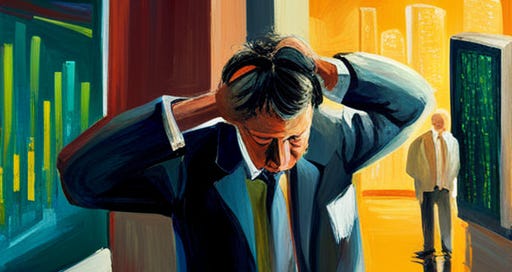You can listen to a professional narration of this article below:
You are - What you think about (Recession, Economy, Stock Market)
I’ve been asked by many readers and some clients for my thoughts on the economy and recession.
As I am typing this, I’m thinking about how much ink I should be spilling on writing about the recession and how much time we, as investors, should be allocating to thinking and worrying about it.
Firstly, our ability to predict it is very limited – the economy is a complex system and thus incredibly difficult to forecast. Don't believe me? The Federal Reserve employs a few hundred PhDs who stare at economic data 24/7 and they have yet to get it right, even once.
Secondly, recessions are not a death sentence to the economy but a natural, transitory phase.
This brings me to the third and most important observation: Time is the currency of life, and attention is how we choose to allocate this currency. As an investor, I can spend most of my day fidgeting, spending my time trying to predict the unpredictable or invest as if, at some point (I don't know when), our portfolio will encounter a recession. Yes, earnings of some businesses will temporarily decline and then come back. Their stock prices may decline as well. But the value of the businesses, if we have done our analysis right, will not really change much. Recession – a temporary decline of cash flows – is a tiny blip in the stream of discounted cash flows.
There are three versions of ourselves: what people think of us, what we think of ourselves, and who we actually are. There is a saying, "Don't tell me what you care about, show me how you spend your time." We are at peace when who we think we are and who we actually are largely overlap. We are even more at peace if the two overlap in the version we'd like to be. We cannot really control what others think of us. The only thing we can do is to behave according to our values; but again, we should not tie our happiness to something we cannot control.
If you want to discover who you truly are, look at how you spend your time. If you are telling everyone and yourself, “I am a long-term investor,” but your daily attention is preoccupied with predicting and trying to avoid the next recession, then something has to change.
By the way, the above applies to many parts of our lives.
If you are interested in reading my latest thoughts on the economy, recession, the housing market and the stock market, here is what I wrote on these topics over the last twelve months. My thinking has not really changed much since.
Check out these articles:
The Stock Market, The Economy, Possible Outcomes, How to Invest
Stock Market Roller Coaster: Prepare for a Decade or Two of Disappointing Returns!
Why non-transitory recession is coming and how to face it as an investor
Are housing prices about to drop? A value investor’s take

Moszkowski Piano Concerto in E Minor
This week I’ll share with you two undeservedly underrated and under-recorded composers that in my not so humble opinion deserve to be overrated and over-recorded. Both lived in the golden age of the late romantic, early modern period of classical music, that is, the late 19th to early 20th century. I want to share with you the Piano Concerto in E minor by Moritz Moszkowski, German-Jewish composer born in Breslau, Prussia (now Poland).
According to that most trusted source, Wikipedia, he was very popular in his day but died in poverty, “sold all his copyrights and invested the whole lot in German, Polish and Russian bonds and securities, which were rendered worthless on the outbreak of the war.” I am not trying to draw parallels between the early 20th century and today, but when he poured his life savings into German government bonds, he probably could not imagine that they would be wiped out – there is a black swan for you!
Vitaliy Katsenelson is the CEO at IMA, a value investing firm in Denver. He has written two books on investing, which were published by John Wiley & Sons and have been translated into eight languages. Soul in the Game: The Art of a Meaningful Life (Harriman House, 2022) is his first non-investing book. You can get unpublished bonus chapters by forwarding your purchase receipt to bonus@soulinthegame.net.
Please read the following important disclosure here.





“Recession – a temporary decline of cash flows – is a tiny blip in the stream of discounted cash flows.”Nice